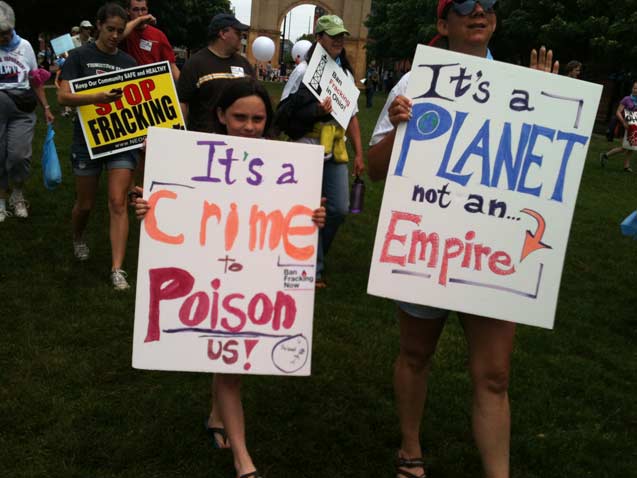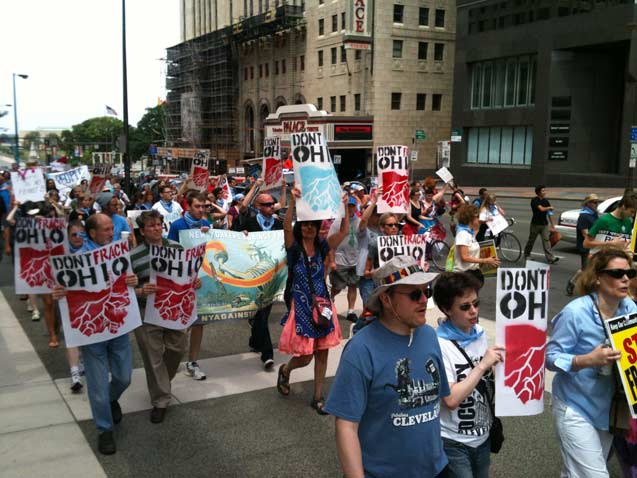Part of the Series
Gas Rush: Fracking in Depth
Columbus, Ohio – Hundreds of people gathered in Ohio’s capital city on Sunday to protest hydraulic fracturing, or “fracking,” the oil and gas drilling process that is rapidly expanding across the Buckeye state as the industry takes advantage of friendly politicians, shale gas reserves and unconventional drilling techniques.
The protesters marched through downtown Columbus and temporarily occupied the front hall of the Ohio Statehouse. The group Don’t Frack Ohio organized the protest and three days of workshops, which featured big name speakers such as “Gasland” director Josh Fox and climate author Bill McKibben.
Protesters expressed anger with regulators and Ohio Gov. John Kasich, who has received more than $213,000 in campaign contributions from the oil and gas industry and agreed to open Ohio’s state parks to oil and gas drilling.
Click here to support news free of corporate influence by donating to Truthout.
Kasich recently signed into law new fracking regulations that environmentalists say establish some solid safety rules, but strip the public of the right to appeal drilling permits and do not require the industry to reveal what toxic chemicals drillers add to fracking fluids. Instead, the fracking chemical cocktails are considered trade secrets and must only be revealed in the event of an emergency.
 Protesters peacefully filled the front hall of the Ohio Statehouse on Sunday to hear testimony from residents opposed to fracking. (Photo: Mike Ludwig)
Protesters peacefully filled the front hall of the Ohio Statehouse on Sunday to hear testimony from residents opposed to fracking. (Photo: Mike Ludwig)
Michelle Goodman traveled from nearby Lancaster, Ohio, for the march and said she is worried that fracking would contaminate the air, water and soil. Goodman and her husband were living in Mansfield, Ohio, where she said public officials permitted fracking wastewater injection wells near the city limits with little public notice. Goodman worries Ohio’s regulators won’t do enough to protect the public and the environment.
“We haven’t bought a house yet, and why would we buy if they can’t protect us?” Goodman told Truthout.
Goodman has also lived in Ohio’s southeast Appalachian region, where she said drilling companies are taking advantage of low-income communities and using aggressive tactics to obtain land and drilling rights.
 Anti-fracking protesters in Ohio want drilling companies to disclose what chemicals they pump into the ground. (Photo: Mike Ludwig)
Anti-fracking protesters in Ohio want drilling companies to disclose what chemicals they pump into the ground. (Photo: Mike Ludwig)
Bruce Duncanson of Lincoln, Ohio, said he organized neighbors in his hometown to ask public officials to reconsider spraying of fracking wastewater brine on the local roads to melt ice during the winter.
Frackers use a mixture of water, sand, salt and chemicals to break up underground rock and release gas or oil. A portion of the millions of gallons of liquid used to drill returns to the surface, sometimes contaminated by radioactive underground metals, and must be treated, stored or reused.
Several municipalities in Ohio and beyond have used fracking wastewater by-products to de-ice roads. Duncanson worries the wastewater still contains toxic additives and radioactive metals, and the industry may use icy roads as and excuse to dump its waste.
“Who knows if they are going to use it as an excuse to just get rid of waste?” Duncanson said.
 Anti-fracking protesters march through Columbus, Ohio. (Photo: Mike Ludwig)
Anti-fracking protesters march through Columbus, Ohio. (Photo: Mike Ludwig)
Ohio is home to nearly 200 injection wells where disposal companies inject spent fracking fluids and other wastewater deep underground. Last year, an injection well near Youngstown caused 12 earthquakes after fluid migrated into an unmapped fault. A final quake on December 31 quake measured 4.0 on the Richter scale and was felt for miles around.
Regulators quickly strengthened injection well regulations shortly after the quake and the industry was quick to point out that wastewater injection, not fracking or drilling, caused the quakes. Fracking does, however, produce millions of gallons of wastewater that is stored in such wells.
A recent study shows that fracking is unlikely to cause earthquakes, but wastewater injection carries a higher risk of causing earthquakes, according to Reuters.
Join us in defending the truth before it’s too late
The future of independent journalism is uncertain, and the consequences of losing it are too grave to ignore. We have hours left to raise the $12,0000 still needed to ensure Truthout remains safe, strong, and free. Every dollar raised goes directly toward the costs of producing news you can trust.
Please give what you can — because by supporting us with a tax-deductible donation, you’re not just preserving a source of news, you’re helping to safeguard what’s left of our democracy.
